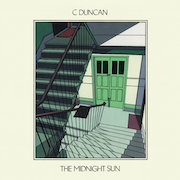C Duncan’s Union Chapel date last year was one of the most satisfying musical experiences of the past decade and, with no small degree of apprehension, I have been anticipating this release for months. This idol must not have feet of clay; this record must be good.
C Duncan’s Mercury Prize-nominated first album, Architect burst onto the scene in July 2015 and was championed by BBC 6Music’s Lauren Laverne, the music world now sitting up, interest piqued by this very distinct new dreampop voice. A year on, however, Midnight Sun is a subtly different record: a little more knowing, slightly shinier, but also somehow more personal. Duncan allows a newly heartfelt vocal style to peep through, his lyrics often intimate; ‘Last to leave’ explores Duncan’s relationship with an ex-boyfriend; ‘Who Lost’ his childhood competitiveness with his brother.
Any apprehension, though, is passing: it takes only moments of the warm, electro-choral opener ‘Nothing More’ for any fears to be allayed. Duncan’s classical background (he trained in composition at the Royal Scottish Academy of Music and Drama) lends an unusual level of harmonic sophistication to his music, and the opening chord progressions of ‘Nothing More’ are something very special. Not only are the chords themselves chosen with a curator’s ear, the voicing is carefully and deliberately balanced; at the right moments the third sings through, or consecutive octaves ground the texture. Duncan is a solo producer, and the meticulous attention to detail that this affords him give a deeply satisfying result.
There is a clubbier, less folky sound to this new album (Duncan says of one track ‘I wanted to write something dark and disco-y. This is what came out.’). The drum and bass rhythms of ‘Like you do’ act as a palette-cleanser after the richer first track. The first utterance of the title coincides with the entry of the bass line on piano and an unexpected major chord; coupled with the emotion in Duncan’s vocal, this moment packs a real punch of pathos.
In the Berlin-scene electronica of ‘On Course’ Duncan’s whistling falsetto hits the stratosphere – angelic vocals sailing over the texture. This track is a masterclass in the power of a simple bass line with layered elements, and of course those oh-so-idiomatic harmonies. It’s perfect as it is, but a sensitive dance remix could make for an utterly euphoric house track.
As the ambient dance mood of the early part of the album continues, ‘Other Side’ employs a catchy melody, steady beat and frequent bass drops to sound like an inspired cover version of an 80s pop hit, and this gift for pastiche shows a cheeky, more curious side to Duncan. Later, ‘Do I hear’ reimagines mid-century easy listening, with prominent acoustic guitar and suave melodies. Here are the synth strings again, but this time they suggest Mantovani’s shimmering orchestra, blown out and repurposed. Then, there’s the feeling of a jazz standard to the titular ‘The Midnight Sun’ – a relaxed rhythm section and an angular melody fleshed out with more of that trademark harmony. From here, things get stranger in the intimate ‘Last to Leave’, with its opening line based on ‘Edelweiss’: a slightly throbbing quality to the production and an off-beat bassline suggest a stuck record and punctuate the sweetness of the familiar melody.
The pulsing bass line and throbbing synths of ‘Wanted to want it too’ recall something like Death in Vegas’s ‘Girls’, with its gleaming, misty aesthetic. Duncan’s haloed voice is almost lost in the texture of the strings which double it, leave it exposed and then rejoin in a moment of rapture.
But in the end it’s those glorious, layered choral harmonies that stand out. And, after the arresting opening of ‘Nothing More’, we return to this territory in ‘Jupiter’ – the introductory high drone, blossoming into chunky chords, making for a deeply satisfying listen. Duncan’s commentary on the track recalls an experimental visit to a gay cruising party in Hamburg with his partner, the song romanticising this as ‘euphoric yet slimy and unnerving’.
Finally, ‘Window’ is a twisted Victorian choral miniature. The slow piano chords and choral parts waver in and out of focus, the sentimental harmonies slightly smudged. Coupled with that ecstatic bloom the effect is, not unpleasantly, rather similar to listening to a church choir while on mdma.
C Duncan, then, is the real thing. He writes melodies you feel you’ve always known, harmonies that satisfy your ears and cadences that strike with and at your heart. If anything, this album is better than his first, as he settles confidently on his recognisable but versatile sound.


